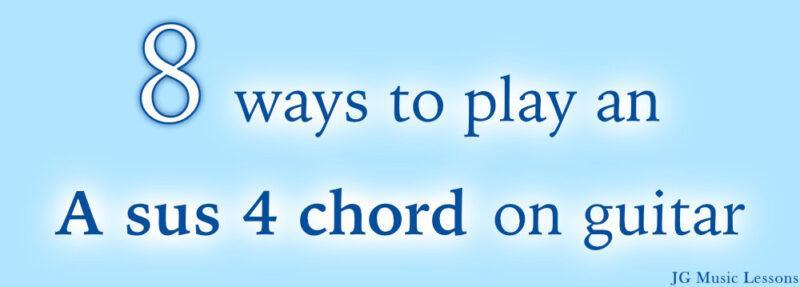After learning your open chords on the guitar, you’ll soon want to know how to play sus 4 chords, which often come up in many popular songs. In this lesson, we’ll be covering the A sus 4 chord, which is short for suspended 4.
The A sus 4 chord has an easy open chord shape but there are many different ways you can play this chord throughout the guitar fretboard. By knowing different A sus 4 chord variations, you’ll be able to use them in different musical contexts.
We’ll first cover some basic chord theory and then show you 8 ways to play an A sus 4 chord which you can start to incorporate into your playing.
Let’s get started.
A sus 4 chord theory intro
A suspended 4 chord means that the 4th degree replaces the 3rd of the chord. For example, a Major triad chord has the chord tones 1, 3, and 5 but a sus 4 chord has chord tones 1, 4, and 5.
This means that an A sus 4 chord has the chord tones A, D, and E.
Here is the formula for sus 4 chords below.
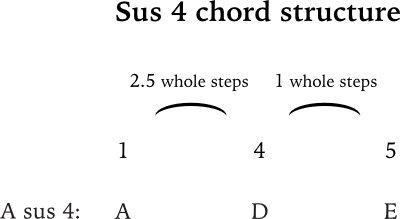
To compare, here are the notes for other chords with A as the root.
- A Major chord has the chord tones A, C#, and E.
- A minor chord has the chord tones A, C, and E.
Now that you know what notes belong to the chord structure, let’s look at how to read the chord charts.
How to read the chord charts
For the charts below:
- The top horizontal line of the chord chart represents the high E string and the bottom horizontal line represents the low E string.
- The vertical lines separate each fret.
- The numbers in the blue dots tell you which fingers to use on the fretting hand.
- The letters on the right of the charts tell you what notes you are playing on each string.
- Circles on the left represent open strings.
- Red X means to avoid that string.
You can check this link for more on how to read guitar notation symbols.
Open A sus 4 chord
This is the most common way to play an A sus 4 chord. This chord is very similar to an open A Major chord, except your pinky is on the 2nd string, 3rd fret.
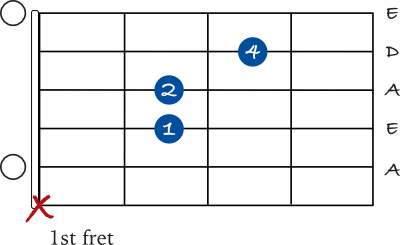
Open A sus 4 chord variation
Most people first learn to play the previous A sus 4 chord, but another way you can play this is with the open 4th string like this:
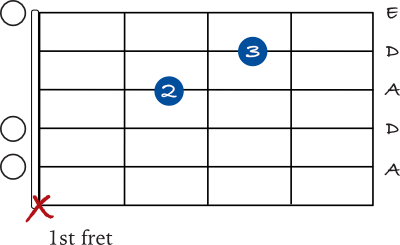
Play the 1st and 2nd chord to hear the slight difference and see which one you like better.
A sus 4 chord – 5th fret
Here is an A sus 4 chord in the middle area of the fretboard which also includes an open 5th string.
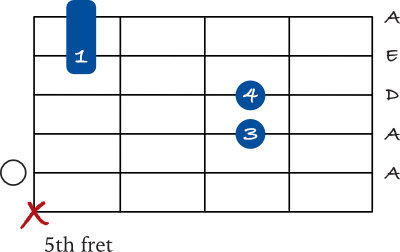
A sus 4 barre chord on the 6th string
You can also play this as a barre chord starting on the 6th string. The following shape comes from the open E sus 4 chord. Notice that the notes on the top 3 strings are the same as the previous shape but we now cover all the strings using our 1st finger like this:
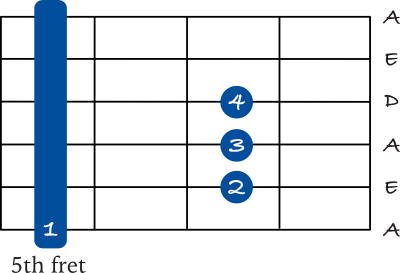
If the barre chord is too difficult to play, first try to get the notes from the 6th to the 3rd string. Gradually add the 2nd and 1st string as you develop more strength in your fingers.
If needed, check out these 5 tips to get better at playing barre chords.
A sus 4 barre chord – 6th string variation
Another variation of the A sus 4 barre chord is to remove the 2nd finger from the previous shape like this:
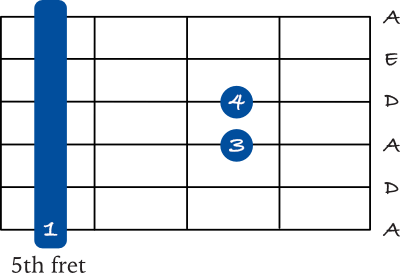
Play this chord variation and the previous shape to hear the slight difference and see which one you like better.
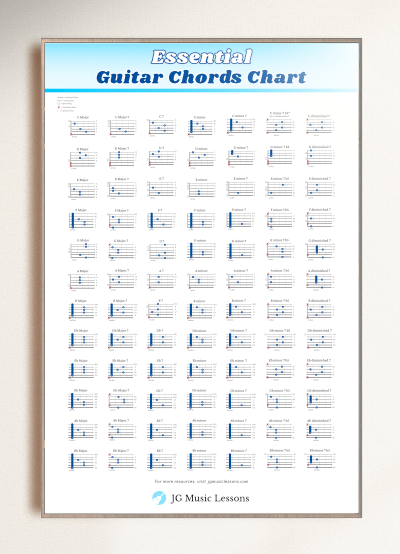
A sus 4 barre chord – 5th string variation
This A sus 4 chord is less common but a good addition to your tool belt. The close distance between the notes in the 4th and 3rd string creates a cool cluster sound.
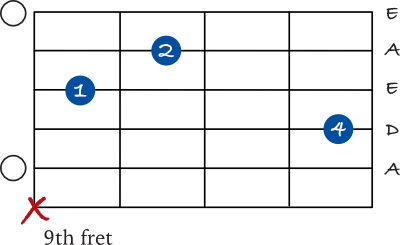
A sus 4 barre chord on the 4th string
Here is the only chord here where the A note is not in the bass, meaning the lowest note. The shape comes from the easy open G sus 4 chord. This is another way you can play this chord when you want the root note highlighted at the top.
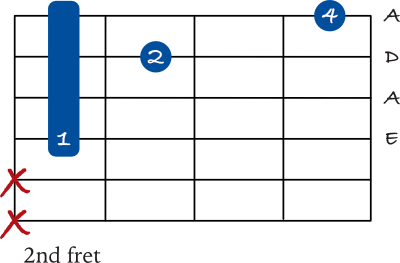
A sus 4 chord 9th fret
Here is one more A sus 4 chord also using an open 5th string. This chord comes from the open D sus 4 shape. This shape is more suitable for a fingerpicking style of playing because some strings are avoided.
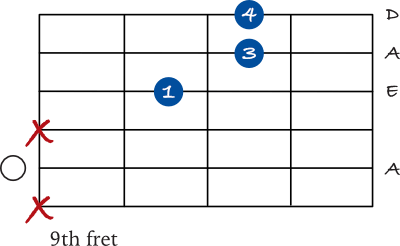
Wrapping up
It’s good to know different variations of playing a sus 4 chord because you have more flexibility to move around the fretboard and also when you need a specific note in the top to help define a melody that you are playing over.
I hope this helped you understand how to play an A sus4 guitar chord or learn new ways of playing it. You can also try shifting the shapes that have all fretted notes to play other sus 4 chords on the same string.
📘 Get the free guitar practice guide here!
All the best,
JG Music Lessons

